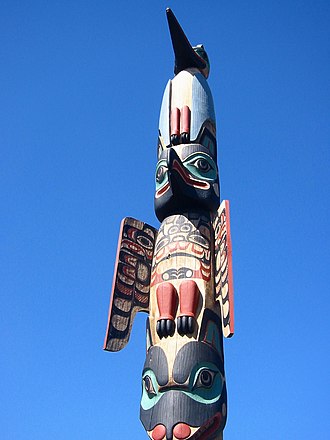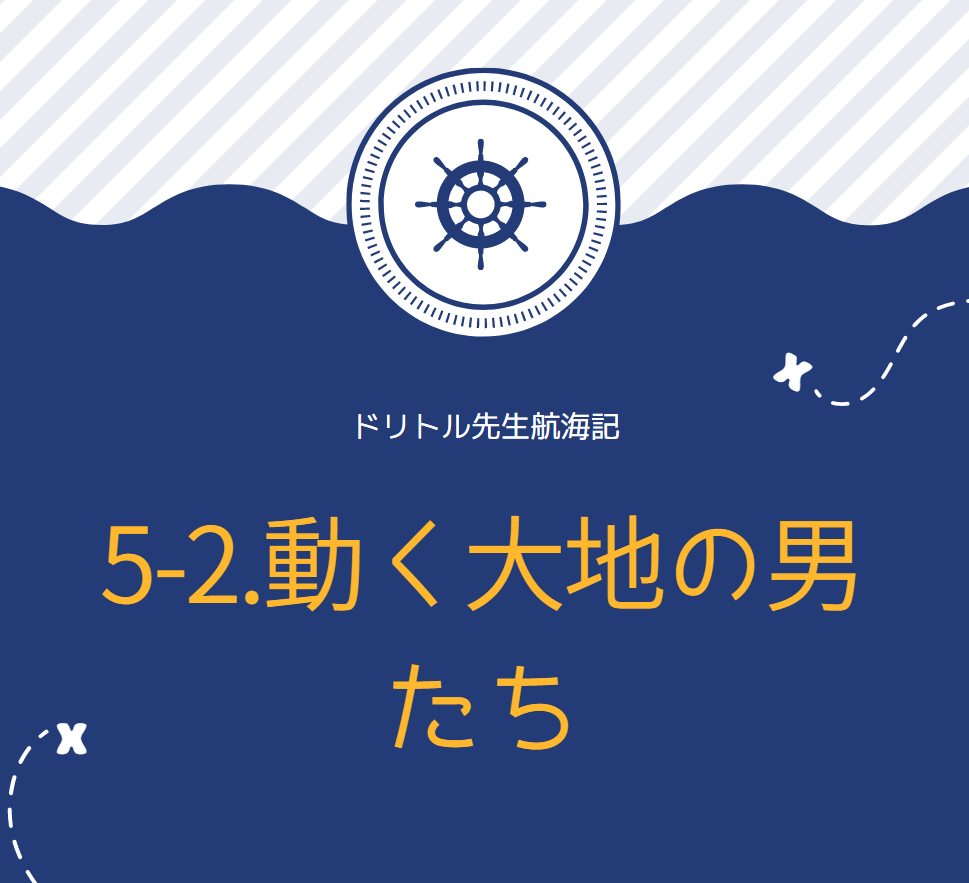FROM that time on the Indians’ treatment of us was very different.
その時からインディアン達の私たちへの扱いが全く変わった。
We were invited to their village for a feast to celebrate the recovery of the lost families.[失われた家族の復帰]
私たちはインディアン達の村で、生きて帰って来た家族を祝う祝宴に招かれることになった。
And after we had made a litter from saplings to carry the sick woman in, we all started off down the mountain.
病気の女の人を運ぶために若木で担架を作った後、私たちみんな山を下り始めた。
On the way the Indians told Long Arrow something which appeared to be sad news, for on hearing it, his face grew very grave.
途中でインディアン達はロング・アローになにか悲しいお知らせらしきものを伝えていた。というのも、そのことを聞いて、彼の顔がみるみる深刻になったからだ。
The Doctor asked him what was wrong. And Long Arrow said he had just been informed that the chief of the tribe, an old man of eighty, had died early that morning.
先生がロング・アローに「どうしたんだい?」と尋ねると、80歳になる部族の酋長が今朝早朝に亡くなったと、たった今知らされたとのことだった。
“That,” Polynesia whispered in my ear, “must have been what they went back to the village for, when the messenger fetched them from the beach.— Remember?”
「だから…」とポリネシアは私の耳元で囁いた。「だから、あの時みんな村へ戻ったんだわ。使いの者がみんなを海岸から連れ戻したのを覚えてる?」
“What did he die of?” asked the Doctor.
「どうして死んだのかね?」と先生は尋ねた。
“He died of cold,” said Long Arrow.
「寒さでなくなりました」とロング・アローは言った。
Indeed, now that the sun was setting, we were all shivering ourselves.
じっさい、日が沈んで私たちはみんな震えていた。
“This is a serious thing,” said the Doctor to me. “The island is still in the grip of that wretched[実に不快な] current flowing southward. We will have to look into this to-morrow.
「これは深刻な問題だ」と先生は私に言った。この島はまだ南へ流れるあのひどい海流につかまったままのようじゃ。明日にでも、このことを調査【する】しないとといかん。
If nothing can be done about it, the Indians had better take to canoes and leave the island. The chance[可能性] of being wrecked will be better than getting frozen to death in the ice-floes of the Antarctic.”
どうすることも出来なければ、インディアン達はカヌーを使ってこの島を離れた方が良いだろう。大破することになるかもしれないが、南極の流氷の下で凍え死ぬよりはましじゃろう」
Presently we came over a saddle in the hills, and looking downward on the far side of the island, we saw the village—a large cluster[集団] of grass huts and gaily colored totem-poles close by the edge of the sea.
やがて丘の鞍部(あんぶ)を越え、私たちが島の向こう側を見下ろすと村が見えた。草ぶき小屋の大集落があり、華やかな色をしたトーテムポール が海岸近くに立ち並でいた。
が海岸近くに立ち並でいた。
“How artistic!” said the Doctor— “Delightfully[面白く, 愉快に] situated. What is the name of the village?”
「なんて芸術的なんだ!」と先生は言った。「素晴らしいところだ。何という村ですか?」
“Popsipetel,” said Long Arrow.
「ポプシペテルです」とロング・アローは言った。
“That is the name also of the tribe. The word signifies in Indian tongue, The Men of The Moving Land. There are two tribes of Indians on the island: the Popsipetels at and the Bag-jagderags at the other.”
「ポプシペテルは同時に部族の名前でもあります。インディアンの言葉で、『動く大地の男たち』を意味します。島にはインディアンの部族が二つあって、こちらの端にはポプシペテル族、あちら側にはバグ・ジャグデラグ族がいます」
“Which is the larger of the two peoples?”
「どちら部族が大きいのですかな?」
“The Bag-jagderags, by far. Their city covers two square leagues.[1リーグ=3マイル=1.6キロ×3=約5キロ] But,” added Long Arrow a slight frown darkening his handsome face, “for me, I would rather have one Popsipetel than a hundred Bag-jagderags.”
「バグ・ジャデラグ族のほうがずっと大きい。町は10キロ四方に広がっています。だが…」ロング・アローはハンサムな顔を少ししかめて暗くしながら付け加えた。「私にとっては、百人のバグ・ジャデラグ族よりも一人のポプシペテルがいいのです」
The news of the rescue we had made had evidently gone ahead of[ずっと先に] us.
どうやら私たちが生き埋めになった人たちを助けという知らせは、私たちが村に到着する前にはすでに伝わっていた。
For as we drew nearer to the village we saw crowds of Indians streaming out[流れ出る] to greet the friends and relatives whom they had never thought to see again.
というのは、私たちが村に近づくとインディアンたちの群れが、二度と会えないと思っていた友人や親族を迎えようとぞくぞくと出てきたからだ。
These good people, when they too were told how the rescue had been the work of the strange white visitor to their shores, all gathered round the Doctor, shook him by the hands, patted him and hugged him.
この善良な人たちも、仲間の救出がこの浜にやってきた見知らぬ白人の働きによるものであると聞かされると、みんな先生の周りに集まり、握手をしたり軽く叩いたり抱きついたりした。
Then they lifted him up upon their strong shoulders and carried him down the hill into the village. There the welcome we received was even more wonderful.
そして、先生を力強い肩の上に載せ、丘から村へと下って運んで行くと、そこで受けた歓迎は、さらにまた素晴らしいものだった。
In spite of the cold air of the coming night, the villagers, who had all been shivering[震える] within their houses, threw open their doors and came out in hundreds.
近づいてくる夜の寒さにも関わらず、家の中で震えていた村人たちみんな、ドアを開けて何百人もの人たちが外へ出てきた。
I had no idea that the little village could hold so many.
私はこの小さな村にこれほど人がいるとは思っていなかった。
They thronged about us, smiling and nodding and waving their hands;
村人たちはにこにこと笑ったり、うなずいたり、手を振ったりしながら、私たちの周りに群がった。
and as the details of what we had done were recited by Long Arrow they kept shouting strange singing noises, which we supposed were words of gratitude or praise.
私たちがやったことがロング・アローによって詳しく語られると、彼らは不思議な歌声をあげたが、それは感謝や賞賛の言葉のようだった。
We were next escorted to a brand-new grass house, clean and sweet-smelling within, and informed that it was ours. Six strong Indian boys were told off to be our servants.
次に私たちは、ま新しい草ぶき屋根の家を案内された。その中は清潔で甘い香りが漂っていて、私たちのものだと知らされた。6人のたくましいインディアンの子どもたちが私たちの召使になるように言い渡された。
On our way through the village we noticed a house, larger than the rest, standing at the end of the main street.
村を歩いていると、私たちは大通りの突き当りに、他の家より大きな家が建っていることに気がついた。
Long Arrow pointed to it and told us it was the Chief’s house, but that it was now empty— no new chief having yet been elected to take the place of the old one who had died.
ロング・アローはそれを指さし、あれは酋長の家だと私たちに話してくれた。「しかし、今は空き家になっています。死んだ酋長に代わる新しい酋長がまだ選ばれていないからです」
Inside our new home a feast of fish and fruit had been prepared.
新しい家では、魚や果物のごちそうが用意されていた。
Most of the more important men of the tribe were already seating themselves at the long dining-table when we got there. Long Arrow invited us to sit down and eat.
私たちがついた時には、部族の長老たち[重要人物]のほとんどは既に長いダイニングテーブルに座っていた。ロング・アローが座って食べようと誘ってくれた。
This we were glad enough to do, as we were all hungry. But we were both surprised and disappointed when we found that the fish had not been cooked.
私たちは、お腹がペコペコだったので喜んでそうしようとしたのですが、魚が生のまま調理されていないと分かって、驚くとと同時にがっかりしてしまった。
The Indians did not seem to think this extraordinary[風変わりな] in the least, but went ahead[ためらわずに先に進める] gobbling the fish with much relish[とてもおいしそうに] the way it was, raw.
インディアン達はこのことを少しも不思議に思っていないようで、生のままとてもおいしそうに魚をがつがつと食べていた。
With many apologies,[謝罪] the Doctor explained to Long Arrow that if they had no objection[反対] we would prefer our fish cooked.
大変申し訳なさそうに、先生はロング・アローに、もし差し支えなければ、魚を焼いてもらいたいと言った。
Imagine our astonishment when we found that the great Long Arrow, so learned in the natural sciences, did not know what the word cooked meant!
私たちの驚きを想像して欲しい!自然科学に博識な偉大なロングアローが、火を使って料理するという言葉の意味を知らなかったとわかった時のことを。
Polynesia who was sitting on the bench between John Dolittle and myself pulled the Doctor by the sleeve.
ジョン・ドリトル先生と私の間のベンチに座っていたポリネシアが先生の袖を引っ張った。
“I’ll tell you what’s wrong, Doctor,” she whispered as he leant down to listen to her:
「つまりこういうことですよ、先生」とポリネシアがささやき、先生は身を乗り出してその話を聞いた。
“these people have no fires! They don’t know how to make a fire. Look outside: It’s almost dark, and there isn’t a light showing in the whole village. This is a fireless people.”
「この人たち、火を使わないのです!火のおこし方を知らないのです。外を見てください。もう暗いというのに、村中に明かりがありません。この人たちは、火を使わない人たちなのですよ」

